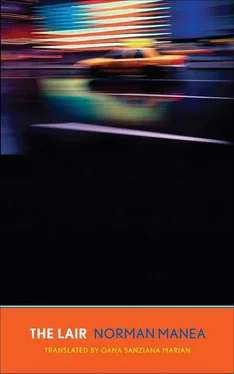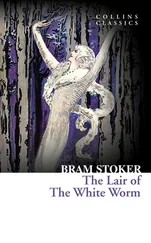At the end, the host gave the guests his card, saying to Lu, “If you need me, call. The third number on the card is less busy.”
The visit didn’t indicate there might be a sequel. But there was one. After a few months of unemployment and short, transitory gigs, Peter called Stolz, without warning Lu, and obtained an interview and a job. A dangerous move, as Professor Gora was about to find out.
He didn’t need a name to recognize her voice, which was inside of him, beyond good and evil, beyond space and time. He grew silent. Embarrassment on both sides. Lu had certainly arrived with great difficulty at this decision, he knew too well. Despair had provoked the call.
“Chauf … chauffeur! Chauffeur … listen. The great Stolz. He.. hired him! Chauffeur. I didn’t know that Peter.. that Peter had wanted to commit su … su.. suicide. He doesn’t admit it. Or he does, but only as a joke,” the suave voice from long ago said.
“Suicide. It’s no longer about walking ten dogs in the park at five dollars an hour. Or triage at the post office. This is something else altogether.”
Lu paused to gather her strength. The couple had obtained drivers’ licenses, before leaving for America. They didn’t have a car, but they knew that it would be impossible to get by in America without driving. They took driving lessons; they took the test, theoretical and practical, and there was also, of course, the inevitable Balkan socialist bribe. Nothing was possible without it. Gora knew this well, as he’d gone through the same ritual himself. The examining officer took home a private bonus for every license obtained. Conscientiously, Lu took the exam and received the license that had already been paid for. Peter didn’t even show up. He received the license in an envelope, in the mail. For the same fee, of course. Yes, Gora remembered the procedure well.
“He doesn’t know what he’s doing. At all. He has no driving experience, at all. But he says he’s fascinated by the Lunar City. As a chauffeur, he’ll scour the cosmos. ‘The lunar monster is made for us somnambulist wanderers,’ he keeps saying.”
Silence. She seemed as frightened by her own words as by the potential digression into another subject. Silence. Gora didn’t feel capable of deviating, either.
So as not to prolong the danger, Lu began to string together the wonders to which Peter aspired, quickly, like a labored recitation from a touristic guide: the Brighton Beach’s Moscow, Little Italy’s Naples, Queens’ Balkans, Pakistan and India, Chinatown, Harlem’s Senegal, Hasidic Brooklyn.
The iceberg of silence that spanned two decades wouldn’t thaw. Gora promised to talk to the potential suicide. To no effect, of course.
He was left only with the echo of Lu’s voice. That wasn’t nothing.
On his first day of work, Peter was to present himself at the house of a certain celebrity, driving one of Stolz’s limousines. A top-level university personality, a politician, a diplomat, it wasn’t too clear. A VIP, that was all, and the rest didn’t matter. He was to take the celebrity to the airport. After that, the taxi-limousine was to arrive at another address, and another, the schedule established by Stolz’s dispatcher.
The novices had trained for two days, three hours per day, in a car that belonged to the porter of the small hotel where they lived.
“Key in the ignition, foot on the gas. Brake. Left, brake. Mirror! Mirror, watch the mirror,” warned the Mexican, sweating in panic. “Slow. Not that slow. Not enough gas. Back! That’s it, left. Your foot, your foot, yes, on the brake. Foot on the brake! Gas, yes. Left. Mirror! Right, mirror on the right. Check the mirror. Always check the mirror.”
The Mexican’s hair was greasy now from perspiration and fright; his small, grimy hands were trembling, his eyes popping; he was crossing himself; he was gripping his small head between his small hands, covering his face so as not to see the next moment. Peter, on the other hand, was perfectly calm, grateful for the training; he liked the wheeled dragon.
He muttered the same word over and over, “Slow, slow…” He’d found his prayer and motto: slow. That was all he needed to keep saying; the mantra would mollify the gods. Slow, go slow, you have time to correct your mistakes. The death race, the burlesque horror movie.
The car engaged, but the driver didn’t. Slow commands, demonic, left, slow, stop, foot, brake, like that, gas, brake, foot, slow, left, too much, too much, now right, slow, mirror, watch the mirror, left, that’s it, stop. Red light, stop.
The prehistoric driver at the wheel of the modern car remained calm and absent. Slow bouts, short commands, the prayer slow. He didn’t hear the apocalyptic uproar of the road; the prayer was protecting him. Slow, slow, as the prayer says.
“The suicidal syndrome,” whispered Lu at one point, in the back seat and in Gusti Gora’s dream.
That’s it, left. Foot! Foot on the brake. Gas, that’s it. Right, the right-side mirror. Slow, stop. Red light! Stop! Collision, stop. A miracle! Arrival! Slow, slow, easy curbs, calm changes of direction, the blare of horns, the despair of drivers who passed alongside like comets, their fists raised to the sky. Happy ending: stoplight.
The gods had spared him; the stoplights had spared him; he believed in salvation. Slowly, terror-stricken, he’d arrived! When, how, who knew but here he was downtown. Little Italy, the celebrity’s residence.
He’d closed his eyes, exhausted, bent his head over the steering wheel, to sleep forever, to pass long minutes of dizziness and elation. Should you kill yourself? Dance every second, in front of the sacrificial altar. The pagan altar. The unknown around you and within you. Above the eagle of destiny, around, life, the primordial wedding. Fear, too, he felt fear, a gothic, luxurious horror. Gas, brake, mirror, horn. Left, right. Slow. Red. Stop. Saved! Short, unpredictable. Liquidated! Saved.
He woke up, smiling, in the mirror, over the wheel, kissing the complicit wheel; enlivened, he looked again at the wheeled monster. It was as if he were perceiving the magical machinery of death for the first time.
He climbed out of the car, rang the bell at the celebrity’s door. A short, agile gentleman. White moustache, a brush of white hair on his calabash of a head, blue bow tie, large hands, large nostrils, hurried, well disposed. He introduced himself quickly, threw the small valise on the backseat, and sat in the front passenger’s seat, near the hussar.
“How … what did you say your name was? Kaspar? Kaspar Hauser? The famous character? Is that it, Kaspar Hauser?”
The driver stared at him, lost at sea. He’d hit on a talker! He was ready for any conversation, if only it could be long, long, so that he’d never need to start that engine. He’ll talk about Kaspar Hauser until nighttime with this fabulous client, and he’ll forget all about the death race.
“My name isn’t Kaspar Hauser. That was a joke. Karl, that’s my name.”
“Karl? Marx? Karl Marx?”
“No. Rossmann. Mynheer Karl Rossmann.”
Peeperkorn would have been too much, Rossmann seemed all right.
“Mynheer? As in, mister? Monsieur Rossmann, Herr Rossmann?”
The passenger stared at him for a long time. Smiling. Ready to burst into laughter, smiling; he liked the game; he liked his playing partner. He was no longer hurrying to the airport. He’d found himself a talker, too!
“Rossmann, you say? Karl Rossmann? Kafka? The American novel? America seen from Prague?”
The driver smiled, too, convinced that the voluble gentleman could even have talked to Peeperkorn. It wasn’t easy to interrupt him, he was jumping out of his seat to find out the immigrant’s biography, his country, his profession, the languages he spoke. He knew a few languages, wasn’t that right? That was the fate of little countries, many languages, wasn’t that right?
Читать дальше












